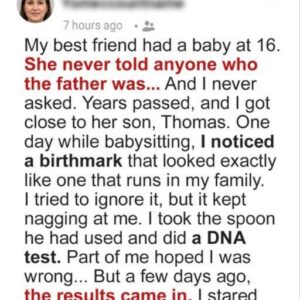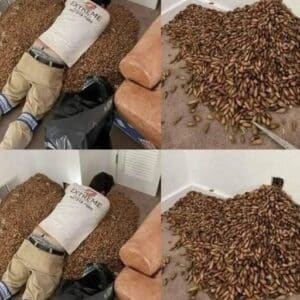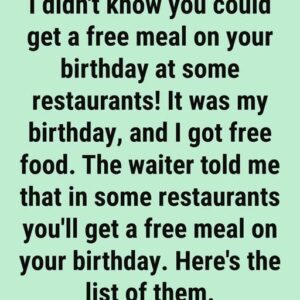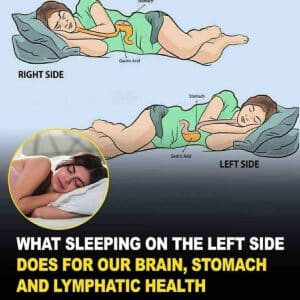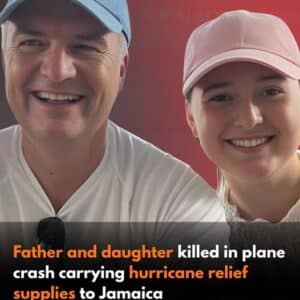It began as an ordinary day in the children’s hospital — the kind of day that already carried too much pain, too many goodbyes. My son Liam was seven. He’d been fighting leukemia for two years, and the doctors had told us that morning it was time to stop. Time to go home. Time to let him rest.
I wasn’t ready. No mother ever is. But Liam — my brave, weary boy — was tired. He just wanted to go home.
We were sitting in the hospital waiting room, waiting for discharge papers, when Liam noticed him — a man sitting quietly in the corner. He was large, bearded, with a leather vest covered in patches and tattoos down both arms. The kind of man who looked like thunder on the outside.
But Liam’s eyes lit up. “Mama,” he whispered, “can I talk to that man?”
I hesitated. “Sweetheart, he’s busy. Let’s not bother him.”
But the man had heard. He stood, smiled gently, and walked over. “Hey, buddy. I’m Mike,” he said, kneeling to meet Liam’s eyes.
“I’m Liam. Are you a real biker?”
Mike chuckled. “Sure am. Been riding Harleys for thirty years.”
Liam grinned weakly. “My daddy wanted to ride motorcycles. Before he died.”
Something flickered in Mike’s expression — a softness that carried both strength and sorrow. “I’m sorry about your dad, son.”
“It’s okay,” Liam said quietly. “He’s in heaven. I’ll see him soon.”
My chest tightened. Mike’s eyes met mine, and in that instant, no words were needed. He understood — not as a stranger, but as a father, a human being standing in the raw presence of love and loss.
Liam reached out to touch one of Mike’s patches. “Do you help kids?”
Mike smiled. “We do. My club brings toys to children in hospitals and shelters. Kids like you are our heroes.”
Liam was quiet, then whispered, “Can you hold me? Just for a minute? Mama’s arms must be tired.”
My arms weren’t tired. I would’ve held him forever. But I knew what he was asking. He wanted to feel something of his father again — strength, safety, that smell of leather and wind.
Mike looked at me, asking permission with his eyes. I nodded through tears.
He lifted Liam gently, as though he were made of glass and light. My son laid his head on Mike’s chest and sighed. “You smell like my daddy,” he murmured.
Mike’s voice trembled. “Your daddy was a good man, Liam. A hero.”
Liam smiled. “I know. Mama tells me all the time.”
The waiting room fell silent. Every person there — doctors, nurses, strangers — watched this unlikely pair: a dying child resting peacefully in the arms of a man who looked like the world had roughened him but not hardened him.
Mike held him for a long time. He didn’t move. He didn’t flinch. Just held him — as if to say, You are safe here. You are seen.
When I whispered my thanks, Mike said quietly, “If my boy ever needed comfort from a stranger, I’d pray that stranger would say yes.”
I asked what brought him to the hospital. “My daughter’s having a baby,” he said, smiling softly. “It’s a good day.” Then he paused. “I’m sorry it’s not for you.”
“It is, in its own way,” I said. “We’re taking him home. He wants to see his dog. Sleep in his bed. Eat his favorite food.”
Mike nodded. “Home’s the best place there is — especially at the end.”
Three days later, Mike came to our house — on his motorcycle. Liam heard the roar of the engine and shouted, “Mama! He came! Mr. Mike came!”
But Mike didn’t come alone. Fifteen bikers followed him — leather vests, long beards, weathered faces, and eyes full of compassion. They brought gifts: a toy Harley, a leather vest small enough for Liam, stitched with patches that read Honorary Member. They even brought a certificate making him part of their club.
Mike knelt beside Liam. “You ready for that ride, buddy?”
“Yes!”
He looked at me. “I’ll go slow. Just around the block.”
Every instinct in me screamed to say no. But then I realized — safety no longer mattered. Joy did. Dignity did. Memory did.
“Yes,” I said. “Go ride.”
The engines rumbled to life. Mike sat with Liam in front of him, small arms outstretched, eyes wide with wonder. Fourteen riders surrounded them in a perfect circle of protection — a living shield of brotherhood and love.
They rode around the block three times. Neighbors came outside, some crying, some smiling. Liam’s laughter rose above the engines — bright, wild, free.
When they stopped, he was glowing. “Mama, did you see me? I was flying!”
“You were, baby. You were flying.”
That was the last time I saw him so full of life. Four days later, he passed peacefully in his bed, with his dog at his feet.
At the funeral, thirty motorcycles lined the parking lot. Mike’s club had come — and others from nearby towns. They didn’t come inside. They stood in formation outside, engines silent, heads bowed. When the service ended, they followed the hearse to the cemetery — a thunderous, reverent escort for a little boy who’d become one of their own.
At the graveside, Mike handed me a folded flag. “This flew on my bike during our last veteran’s ride,” he said. “We want Liam to have it. He was one of us.”
I broke down. Mike caught me as I wept.
“He loved you,” I whispered. “You gave him peace. You made him feel brave.”
“He was brave,” Mike said. “Braver than any of us. It was an honor to know him.”
Eight months have passed. Mike and his brothers still check on me. They helped fix my car, brought food, and invited me to join their Christmas toy run — the same one Liam had dreamed of.
I went. I rode with them. We delivered toys to the children’s hospital. The same halls where my son once reached out to a stranger — and found family.
I learned something sacred in those moments: kindness doesn’t always wear a gentle face. Sometimes it looks like leather and tattoos, steel and thunder — but underneath, it’s the same mercy that moves the world.
That day, a biker held my dying son. But what he really held was humanity — fragile, fleeting, holy.
And when I look at Liam’s little vest hanging on his bedroom wall, I know: love comes in many forms. Some wear white coats. Some ride Harleys.
But all of them — in their own way — carry heaven in their hands.
